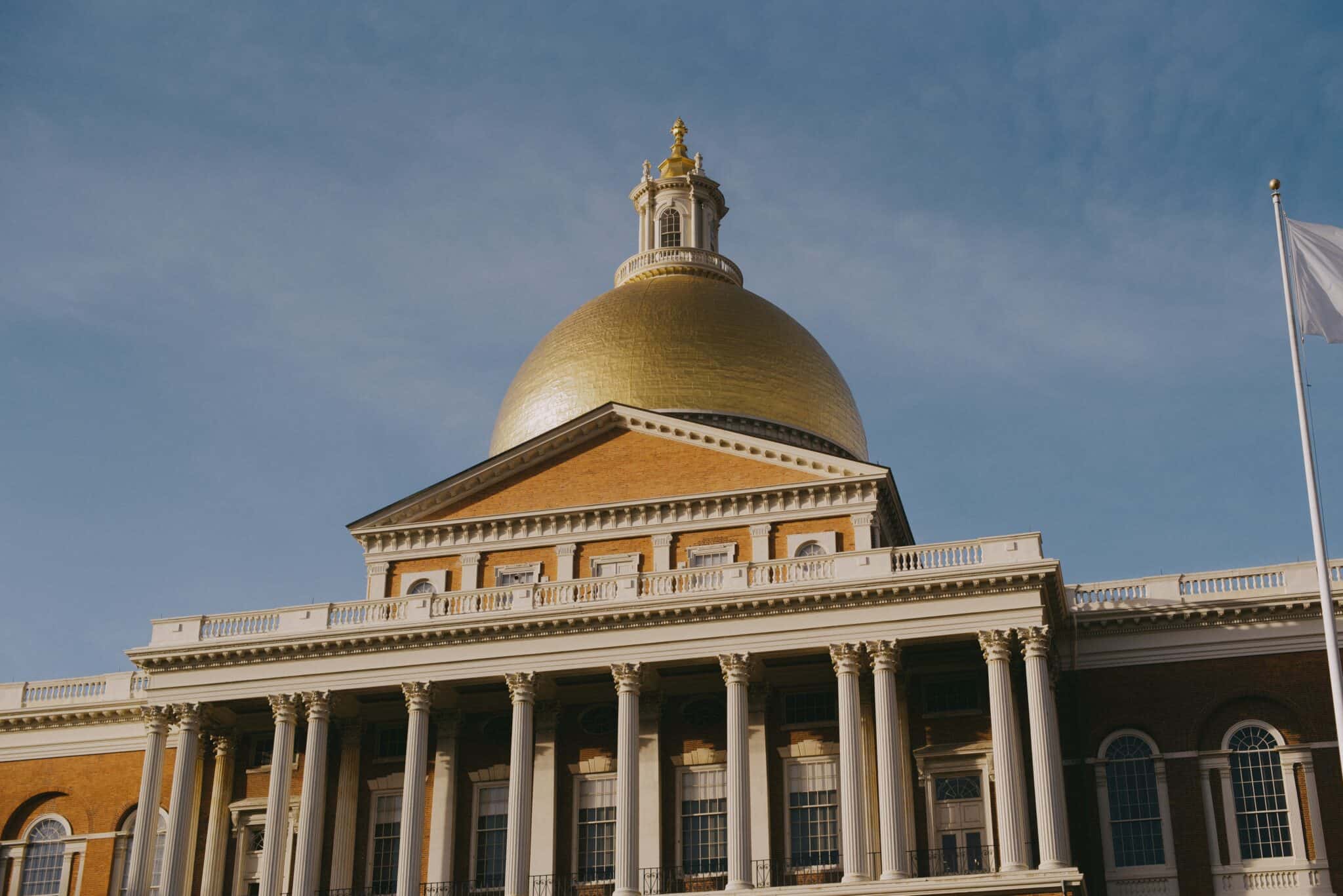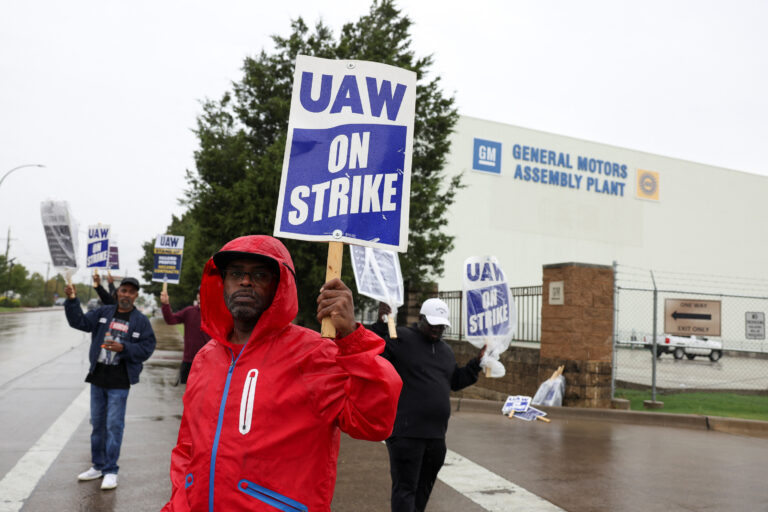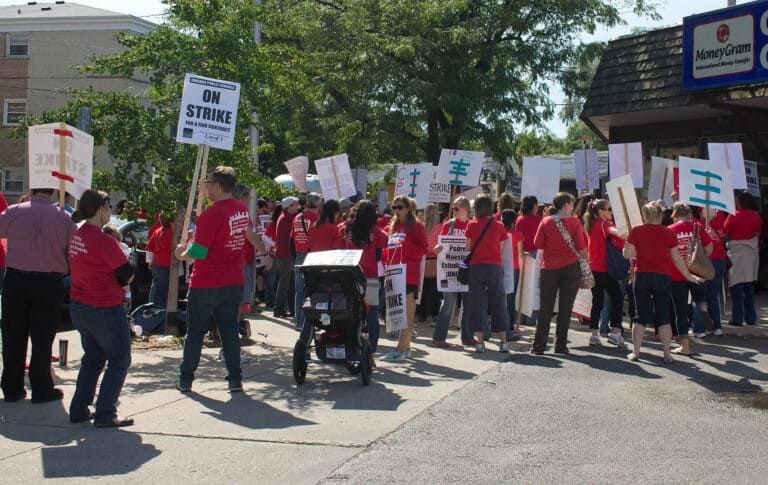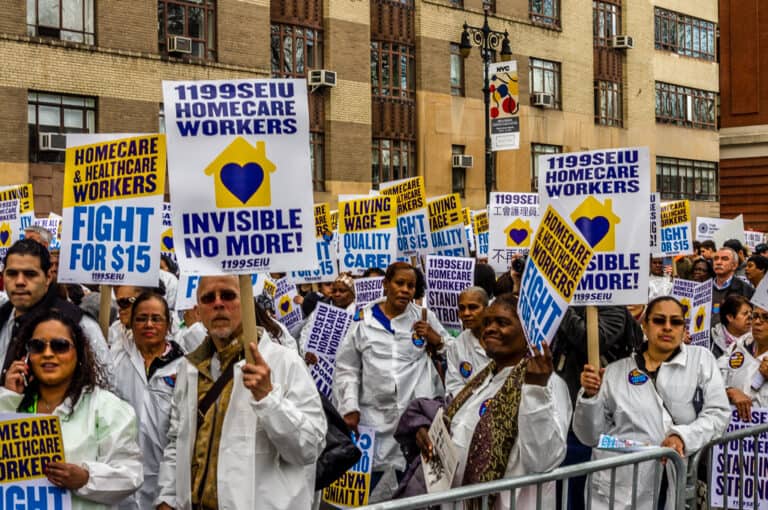Jack is a student at Harvard Law School and a member of the Labor and Employment Lab.
For the third time since 2017, Massachusetts legislators have quietly suppressed a bill that would repeal Section 9A of Chapter 150E of the General Laws. Section 9A prohibits public employees like teachers from engaging in or encouraging “any strike, work stoppage, slowdown or withholding of services” and authorizes courts to use extreme measures like daily fines and even imprisonment to enforce compliance.
This past January, just like in 2018 and again in 2020, the Joint Committee on Labor and Workforce Development ordered the bill “sent to study” — ostensibly a procedure for conducting further analysis but universally considered “a convenient way for the Committee to quietly kill the bill” without the political risks of voting for or against the bill.
Relegating this important proposal to the dark abyss of endless study is a disservice to the Commonwealth. Instead, legislators should pass this bill and redress a century of pernicious public policy born of disreputable motivations and marred by rampant, justified defiance.
A History Rooted in Fear
Section 9A was originally passed during the First Red Scare, in response to pervasive anticommunist sentiments and violent turmoil brought about by state-sanctioned unionbusting during the Boston Police Strike.
In 1919, motivated by low pay, poor working conditions, and rebuffed attempts at redressing workplace grievances, the Boston Police Union sought to join the American Federation of Labor. This immediately drew intense condemnation. As Professor Erik Loomis explained: “The Boston police commissioner and the chamber of commerce argued that police could not be unionists because it would create ‘divided loyalty,’ a phrase demonstrating their fear the cops would no longer be a force dedicated to defending the interests of capitalists.” The commissioner refused to recognize the union and suspended nineteen of its leaders with a warning that they could either reconsider unionizing or be fired. This in turn sparked a strike vote, which passed 1,134 to 2.
Immediately following the vote, the press “surrendered itself to sensationalism,” and without any evidence of “radical influence, all major Boston newspapers immediately labeled the strike decision ‘Bolshevistic.’” One outlet declared that “behind Boston in this skirmish with Bolshevism stands Massachusetts, and behind Massachusetts stands America.’”
After reading these fearmongering reports, the public prepared for mayhem; this quickly became a self-fulfilling prophesy. When less than 30% of the police force showed up to work the next day, pandemonium ensued. As one account described it: “The problems began when street gangs took advantage of the lack of police presence and started looting, vandalizing, and harassing the public” and were compounded when, in the throes of the harshly antilabor Red Scare, “the national media blew the incidents out of proportion.”
Sensing a political opportunity, the Commonwealth’s conservative governor, Calvin Coolidge, dispatched cavalry armed with swords and guns to restore order. Despite leaving nine people dead in their wake, the cavalry successfully regained control and Coolidge was proclaimed a hero. His hardline stance turned into an oft-repeated mantra: “There is no right to strike against the public safety by anybody, anywhere, any time.” He rejected an olive branch extended by the union and ordered that all of the striking officers be permanently fired and replaced.
As he had hoped, this antiunion fervor propelled Coolidge from relative obscurity to national prominence. Within two months, Coolidge’s margin of victory in the gubernatorial race increased sevenfold from his prior contest against the same opponent, and by 1920, he had defeated Franklin Roosevelt to become Vice President. Coolidge’s antilabor-fueled ascendency reached its apex in 1923 when he assumed the presidency.
The labor movement, though, fared far worse: “The aftermath of the Boston strike significantly damaged public-sector unionism. Many local governments banned not just police unions, but also all forms of public-sector unions. . . . For decades after the strike, policymakers and judges associated all forms of public-sector unionism with the horror of the Boston strike.” It was against this backdrop that Massachusetts enacted its prohibition against public-sector strikes.
A History of Widespread Defiance to Remedy Unjust Working Conditions
With the original justifications offered for prohibiting public-sector strikes — like stemming the tide of “Bolshevism” and preventing officers from having “divided loyalties” injurious to capitalists — debunked as the products of outdated, since-discredited fearmongering and political opportunism, a brief survey of illegal strikes since Section 9A’s inception offers additional compelling reasons for the law’s repeal.
Not only have public employees and their unions over the past century been willing to defy this prohibition and incur severe penalties — including hefty fines and imprisonment — with remarkable (and increasing) frequency; they have done so as last-ditch attempts at achieving parity in stalled negotiations and galvanizing public support to rectify fundamentally unfair or unsafe employment conditions. As one article explained, “as soon after teachers won the right to collectively bargain their contracts, they were ‘constantly having to go on strike’” just to secure basic concessions from school committees — a phenomenon that has endured to this day.
In 1977, for example, Franklin teachers went on strike over “mounting concerns about pay, seniority, and maternity leave and about rowdy, violent students,” including students who the district failed to adequately prevent from streaking nude through the library, regularly drinking beer openly in the school parking lot, and even clubbing a police officer over the head with a brick while he was responding to an in-school fight. The striking teachers were imprisoned for two weeks and each fined today’s equivalent of several thousand dollars. One pregnant teacher who had been trying to conceive a child for several years miscarried during her incarceration.
Because of Section 9A, these teachers were faced with an impossible choice: Subject themselves to alarmingly dangerous working conditions, or go to jail until they agree to do so.
Dedham teachers faced a similar choice in 2019 when they voted 275–2 to illegally strike over the school district’s refusal to provide adequate health insurance or salary adjustments, or to institute reasonable protections against sexual harassment. Likewise, teachers in Andover were found to have engaged in an illegal strike in 2020 during an early spike in local Covid-19 cases. The teachers were scheduled to participate in virtual professional development from their respective classrooms but, citing unacceptable ventilation and a significant risk of contracting Covid, they instead chose to participate from the school’s parking lot. This was ruled an illegal strike, and the teachers were ordered inside.
These stories are all too commonplace in Massachusetts. Unfortunately, striking is often the only effective way for employees to effectuate important changes in working conditions. As one group explained: “It is only when workers can withhold their labor without the threat of losing their job that they have power in the workplace to win fair wages, fair benefits, and safe working conditions.” Forcing public employees to choose between laboring for the state under unsafe or unfair conditions and going to jail is simply unconscionable.
To be sure, certain provisions could be written into law to guard against sudden, life-threatening interruptions of critical services like those provided by firefighters and corrections officers. One compromise bill aims in part to achieve a proper balance. But Massachusetts legislators should nevertheless heed the example of eleven other states that have acted without adverse consequences and repeal its blanket prohibition on public-sector strikes.










Daily News & Commentary
Start your day with our roundup of the latest labor developments. See all
July 11
Regional director orders election without Board quorum; 9th Circuit pauses injunction on Executive Order; Driverless car legislation in Massachusetts
July 10
Wisconsin Supreme Court holds UW Health nurses are not covered by Wisconsin’s Labor Peace Act; a district judge denies the request to stay an injunction pending appeal; the NFLPA appeals an arbitration decision.
July 9
In Today’s News and Commentary, the Supreme Court green-lights mass firings of federal workers, the Agricultural Secretary suggests Medicaid recipients can replace deported farm workers, and DHS ends Temporary Protected Status for Hondurans and Nicaraguans. In an 8-1 emergency docket decision released yesterday afternoon, the Supreme Court lifted an injunction by U.S. District Judge Susan […]
July 8
In today’s news and commentary, Apple wins at the Fifth Circuit against the NLRB, Florida enacts a noncompete-friendly law, and complications with the No Tax on Tips in the Big Beautiful Bill. Apple won an appeal overturning a National Labor Relations Board (NLRB) decision that the company violated labor law by coercively questioning an employee […]
July 7
LA economy deals with fallout from ICE raids; a new appeal challenges the NCAA antitrust settlement; and the EPA places dissenting employees on leave.
July 6
Municipal workers in Philadelphia continue to strike; Zohran Mamdani collects union endorsements; UFCW grocery workers in California and Colorado reach tentative agreements.